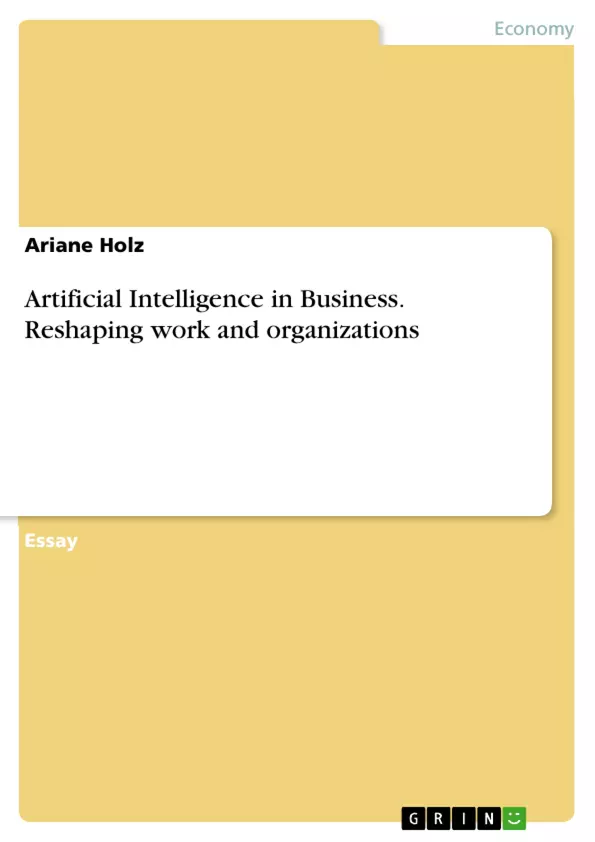This essay analyses artificial intelligence (AI) and aims to discuss the impact of future technologies on current work and organisations and how they will affect management decision making. In light of this, I will examine how humans perform better with the help of machines, which fields humans cannot (yet) be replaced in and how human and machine intelligence can be combined to create opportunities for technological amplification.
Artificial intelligence (AI) technology is evolving fast and is shaking up work and organisations. The term is commonly defined as the “work processes of machines that would require intelligence if performed by humans”. With computers, algorithms, and software optimising workflow every day, it is hard to imagine how life would be managed without them. While AI is increasingly taking on human tasks, there is hardly an industry that will remain untouched by the progressive technological development.
The strong influence of AI on the workforce poses a challenge to managers as how to handle and integrate new technologies into the workforce, maintaining effective organisations.
Inhaltsverzeichnis
- Artificial Intelligence in Business – Reshaping work and organisations
- How Humans Perform Better with Machines
- Technological Unemployment
- How AI is Transforming the Audit Profession
- Management Decision-Making in the AI Era
Zielsetzung und Themenschwerpunkte
This essay aims to explore the impact of artificial intelligence (AI) on contemporary work and organizations, examining how AI is reshaping management decision-making processes. The essay delves into the interplay between human and machine intelligence, highlighting the strengths and limitations of each, and exploring how they can be combined to enhance performance.
- The impact of AI on the future of work and organisations
- The comparative advantages and disadvantages of human and machine intelligence
- The role of AI in automating tasks and improving efficiency
- The challenges and opportunities associated with integrating AI into the workplace
- The changing role of managers in the AI era
Zusammenfassung der Kapitel
- This chapter explores the ways in which humans and machines complement each other. It argues that machines excel at processing information and identifying patterns from big data, while humans possess strengths in areas such as judgment, creativity, and understanding context. It also discusses the implications of Maslow's hierarchy of needs for the relationship between humans and machines in the workplace.
- This chapter examines the historical and contemporary impact of technological unemployment, highlighting the potential for job displacement as AI advances. It examines the vulnerability of low-skilled workers to job displacement compared to high-skilled workers and discusses the types of jobs that are difficult to automate, such as those involving managing people, creative work, and strategic planning.
- This chapter focuses on the transformative effects of AI on the audit profession. It discusses the increasing reliance on AI-powered programs for tasks such as analyzing data and identifying patterns, and explores the changing responsibilities of auditors as a result of AI integration. It also highlights the need for managers to understand the new skills and responsibilities required for successful auditing in the AI era.
- This chapter examines the impact of AI on management decision-making. It suggests that AI will increasingly take on administrative and routine tasks, freeing managers to focus on strategic thinking and decision-making. It also explores the importance of collaboration between humans and machines, the need for managers to adapt training and performance evaluation processes, and the challenges of managing a workforce where AI is playing an increasingly prominent role.
Schlüsselwörter
The key themes and concepts explored in this essay include artificial intelligence, technological unemployment, automation, management decision-making, human-machine collaboration, workforce of the future, and the impact of AI on various industries, such as auditing and consulting.
Frequently Asked Questions
How is Artificial Intelligence (AI) reshaping work and organizations?
AI is automating routine tasks, optimizing workflows, and changing how management decisions are made by providing data-driven insights from big data.
Can AI replace human managers?
While AI excels at processing information, humans remain irreplaceable in areas requiring judgment, creativity, emotional intelligence, and strategic planning.
What is "technological amplification"?
Technological amplification refers to the combination of human and machine intelligence to enhance overall performance, where machines handle data processing and humans focus on high-level decision making.
How does AI impact the audit profession?
AI transforms auditing by automating data analysis and pattern identification, allowing auditors to focus on higher-risk areas and more complex advisory tasks.
What are the risks of technological unemployment?
Low-skilled workers are more vulnerable to job displacement as AI advances. However, new roles are created that require collaboration with AI technologies.
- Quote paper
- Ariane Holz (Author), 2018, Artificial Intelligence in Business. Reshaping work and organizations, Munich, GRIN Verlag, https://www.grin.com/document/482992



